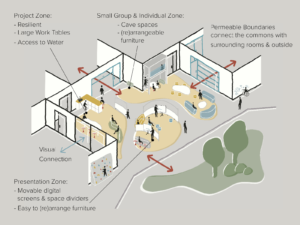Common Core: Better Standards, Conditions, Tools, & Outcomes

Over the past week, three states have passed bills to pull their states out of Common Core State Standards–the shared learning expectations for K-12 students adopted by 45 states. Bills are now sitting on the Governor’s desk in Oklahoma, Missouri, and South Carolina.
Leaving the Common Core would be like a group of phone users leaving iOS or Android and going back to Blackberry–few apps, few updates, few friends. The politically motivated change would lead to weaker expectations, less teacher collaboration, and higher costs.
On the other hand, it’s exciting to see more than 40 states working together on voluntarily common college and career ready expectations for students–it makes states more competitive, is embraced by teachers, and is unleashing an avalanche of innovation.
Better Goals. Common Core State Standards give all students a shot at college and family wage jobs. They are a big improvement over the hodgepodge of expectations developed state by state. The theme of “fewer, deeper, clearer” expectations really strikes a chord with teachers. The new standards stress applying knowledge and critical thinking rather than simple rote memorization.
With mobile families and a mobile workforce, it doesn’t make sense to have different expectations for reading, writing, and math state to state. Common Core State Standards are well written standards for reading with comprehension, writing with precision, and solving complex problems. It’s not a curriculum or a testing program. States that have adopted the Core set their own graduation requirements, define expectations in other subjects, and pick their own test. School districts continue to make curriculum decisions.
Collaboration. Teaching has been an isolating profession with individual teachers laboring with little support and few professional connections. Online learning communities and common standards have changed that for hundreds of thousands of teachers in the last three years. For the first time educators (and parents) can share tools, resources, and strategies across state lines.
Platform For Innovation. The iPhone quickly became a platform for innovation–there are over 1 million apps for iPhone and over 100,000 #EdApps. Common Core has had the same effect in education–it has unleashed more than $1 billion of private investment by foundations and venture funds supporting the development of apps, platforms, tools and templates that can be shared nationwide. A great example of shared resources are the open writing prompts from the nonprofit Literacy Design Collaborative–the result is more and better writing to common standards across the high school curriculum.
Better Outcomes. The folks whipping up the Core backlash are aiming for political points not academic gains. They don’t speak for most folks on the right–see Conservatives For Higher Standards.
The digital learning revolution is expanding student options and extending the reach of great teachers. Higher common standards and more collaboration are leading to better teaching. The combination of common standards and digital learning is a recipe for improvement and innovation.
This post was first submitted to Huffington Post.







Richard Patel
I would like to examine what you are addressing:
1. Better Goals. Perhaps, but not universally so. These goals may be better than no goals, and may be better than some state and district goals, but forcing them on everyone,there are some districts that are going to see a watering down of their education (a reduction in the coverage of literature to cover non-fiction because the tests will cover that, and the teachers' jobs are tied to the test. REsult: kids even more bored and turned off to learning.
2. Collaboration. Good teachers have been collaborating for decades, and since the internet 20 years ago this has grown. The common core does nothing to enhance collaboration. Part of the common core state mandates requires a much more competitive evaluation system for teachers, so we are seeing that teachers are far less willing to collaborate locally because collaboration isn't a part of that evaluation, and helping my colleague could help me out of a job. I cannot disagree with you more when you claim common core enhances collaboration.
3. Innovation. You claim money enhances innovation because the common core released all of this money .. as if this money was magically hidden in a "common core cave" for decades, and would only come out when common core existed. Where was that money to innovate 10 years ago? Why do you think hat suddenly this is a good investment. You fail to explain this. Why is this change in education the magic bullet that will fix everything after a century of of reforms and changes? Perhaps in areas where there are poor school there is hope, but where there are good schools, we see meddling in something that was already working by undergoing constant reflective evaluation. This system, with its new evaluation, squelches innovation among teachers at many schools as they do what is needed to hold on to their jobs (innovation is also missing from the evaluation scheme that is a part of common core).
4. Better outcomes. I'm not a politician. I don't care for most of them on either side of the aisle. I am a teacher. I help students. This is not something that I see helping them get better prepared for a job or college, and I certainly don't see them wanting more education after this. We are seeing kids who are burned out and under anxiety so intense that they refuse to come to school ... and common core has only begun.
I wish I could share your enthusiasm, but on the front lines, I am not seeing common core as any improvement on NCLB. I firmly believe that it too will fail. Perhaps then we can finally look to a common sense approach that is not a simple one sized fits all approach to solving the problems that plague some schools, and leave those who are doing a good job alone to do what they do best.
Schools should not be run like businesses any more than businesses should be run like schools.
Replies
Tom Vander Ark
Richard, thanks for your comments
1. There may be districts with higher standards, I don't know of any. I appreciate the balanced literacy approach including nonfiction.
2. Common standards let teachers share resources, tools, and strategies linked to specific standards--a huge benefit. I appreciate that you don't' like new eval systems adopted by some states--I bet we'd agree on some improvements--but that's a different issue.
3. My paper Boosting Impact goes into the investment issue in some detail: http://cdno.gettingsmart.com/wp-content/uploads/2014/03/Boosting-Impact-Final.pdf
It's the confluence of better broadband, app development platforms, learning platforms, cheap devices, and common standards that have unleashed investment. It's coming from some of the same sources that have invested for 10+ years and from a whole new crop of investors excited about the potential for impact & return
4. Common Core is a set of reading, writing, and math standards--and they're a lot better than most previous state standards. Like you, I'd like to see better tests and accountability system, and much more robust professional development--see our new paper on competency-based prep/development: http://cdno4.gettingsmart.com/wp-content/uploads/2014/01/FINAL-Preparing-Teachers-for-Deeper-Learning-Paper.pdf
S Magana
Its time we stop focusing so much on the standards within Common Core and focus more on assessment techniques. The intent behind Common Core (and NCLB) is admirable. Unfortunately, the implementation relegates some of our schools to a place where students learn test-taking skills rather than learn content within useful contexts. Not all schools, but far too many.
Let's push authentic assessment with the same fervor of Common Core standards. Then maybe we'll see the improvements in learning we all expected from supporting universal standards.
Replies
Tom Vander Ark
I'm spending the week in a district trying to overcome a decade of test prep, so I get it. I'm afraid state summative will for the foreseeable future run 5+ years behind what's possible. I'm glad to see more writing required in PARCC & SB.
As we discussed, it would help schools use more authentic assessment if the toolset was better. Our recent paper Assessing Deeper Learning: A Survey of Performance Assessment and Mastery-Tracking Tools ( http://cdno4.gettingsmart.com/wp-content/uploads/2014/04/FINAL-Assessing-Deeper-Learning.pdf ) suggests lots of room for improvement in tools that will make it possible for teachers to make effective and regular use of performance assessment.
Ze'ev Wurman
Well, well, ... not so fast.
The issue of student mobility is hyped beyond any reasonable scale. Overwhelmingly, mobility is within the state, and that has been addressed since NCLB required all states to have state-level academic standards. If that didn't work out well enough -- researchers find huge across-school differences *within states* generally exceeding cross-state differences -- expecting NATIONAL standards to improve the experience over state-level standards is an exercise in naivete.
Further, inter-state mobility is barely 1.6% per year, including army brats and all (table B07001 here http://factfinder2.census.gov/). Surely the idea of imposing uniformity on the whole country for this flimsy excuse is a classic case of the tail wagging the dog.
But I particularly laughed at your argument "leaving iOS or Android [is like] going back to Blackberry." Really? Wouldn't a better analogy to rushing to Common Core be like jumping to ADA over staying with C and C++, or jumping to VHDL rather than staying with Verilog? (That's what our federal government pushed American companies to do in 1980s and 1990s, in case you don't know). Or, perhaps, rushing to OSI and ISDN (the wet dreams of our telecomm regulators at that time) rather than staying with the open Internet and DSL. Or should I remind you that president Ford signed the Metric Conversion Act in 1975 (yes, THAT long ago!) and it died a silent death less than 10 years later?
Some common sense and restraint, please. The Brave New World where all kids are "college-ready" and all teachers teach the same thing across this nations are not around the corner yet ... thankfully!